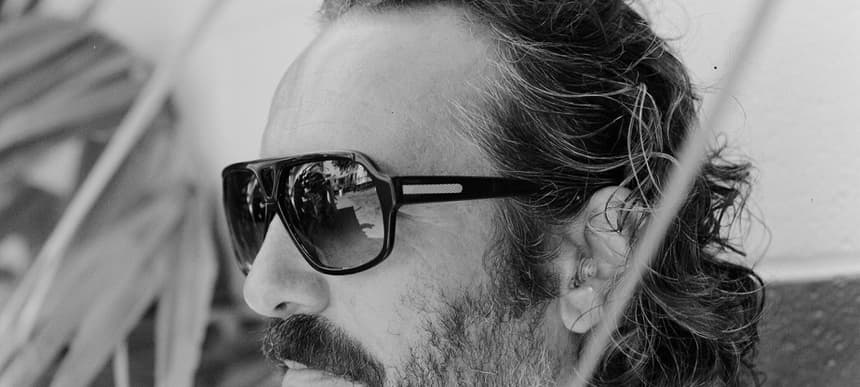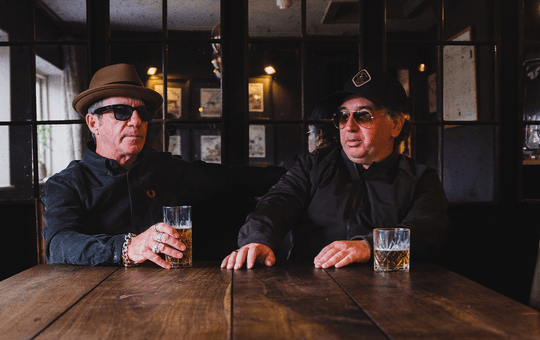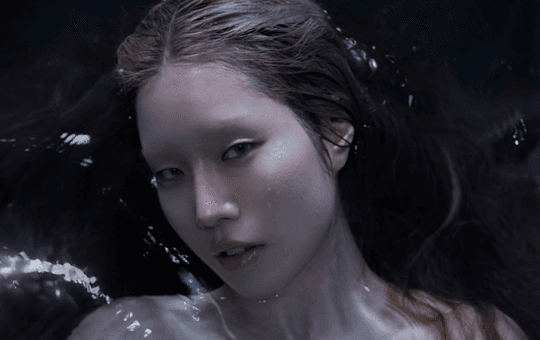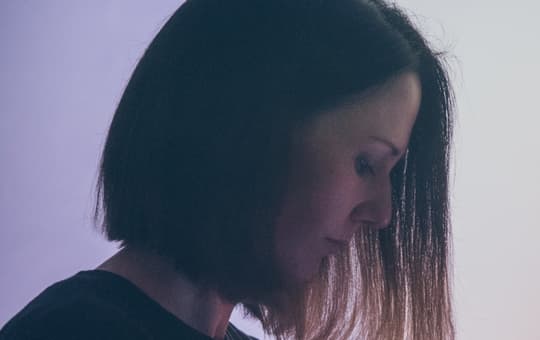
DJ Harvey: “I’ll never forget Miss Nude Australia dancing naked on the decks for me.”
“I’ll never forget Miss Nude Australia dancing naked for me on the decks,” comes a chuckle down the phone. “It got me into a lot of trouble actually, because the club didn’t have a strip license.”
I’d only gone as far as to ask Harvey what abiding memories from his mid-’90s Ministry of Sound residency he still carries today. Perhaps I should know better than to be surprised that his fondness for the era is typified by an act of lewd indecency. He goes on, “I have an endearing memory of her vagina reflecting in the sweaty bald head of Gary Salzman (Todd Terry’s then manager).” It’s a powerful image, I assure him. “And an enduring one,” he adds.
This Saturday sees Harvey returning to the Ministry of Sound, for the first time in decades. While for his followers, this marks another significant homecoming since his disappearance to America at the turn of the century, Harvey has yet to find his rose-tinted glasses. “I remember DJing another time and this overwhelming smell of piss was filling the club. Turns out these erotic dancers had been brought in from New York and one of them had pissed in the smoke machine, so there was this piss mist that had filled the entire club. It left a real bite at the back of the throat.”
In his long and storied career, his Ministry of Sound residency perhaps marks the point Harvey the record-collector and party-maker was forced to become Harvey the professional DJ. At least that’s the sort of narrative we, the collectors and connectors of the anecdotes and chapters of his career, would like to apply. “It was a big ship to drive,” he agrees. “Especially when the original sound system was in—I was honoured to have been one of the first English DJs to have expressed myself on that system.” The club, as a venue purpose-built to emulate the great hedonist spaces of lore, remains for him an important landmark— “it’s still, to this day, probably the best club in Europe acoustically and layout wise.”

However, this year’s return to the Ministry of Sound—or the Misery of Pound, to give it its oft-referred to name according to Harvey—is not one imbued solely with good memories. “I had a love-hate relationship with the place,” he concedes. “They were always giving me shit because I wasn’t their boy—I would do things like DJ Ministry in a Cream jacket and that would always upset apple cart.” Whether smothered by the commercial clutches of a super-club in the capital, or just giving in to the primal urges of his inner-rebel without a cause, during the tenure of his residency Harvey often found himself in the headmaster’s office, so to speak. “I’d be taken down to the Ministry shop and be given a jacket, a record bag, a baseball cap, some underpants and a coffee cup—and I’d still show up next week in a Cream jacket.”
Despite some misgivings—issues he puts down to being a Brit and “enjoying a moan”—throughout our discussion of the club Harvey is keen to express his gratitude to the club’s founding father, Justin Berkmann, “I think the first year or two, before it was taken out of Justin’s hands it was more easy going and people were there for the right reasons.” In Harvey’s eyes the club, at its genesis at least, had divine aspirations. “His initial inspiration was the Paradise Garage, which was by its nature the ultimate hedonistic establishment.”
“I remember DJing another time and this overwhelming smell of piss was filling the club. Turns out these erotic dancers had been brought in from New York and one of them had pissed in the smoke machine, so there was this piss mist that had filled the entire club. It left a real bite at the back of the throat.” – DJ Harvey
Perhaps it was this prospect, finding the Paradise Garage in Elephant and Castle, that kept Harvey in the club despite his frustrations with the management. During his first trip to the USA in the ‘80s he went to New York, as he puts it “in search of hip-hop.” While he might have found that, and many other things, the Paradise Garage was one club that evaded him. “I ended up going to many nightclubs: the Saint, the Devil’s Nest, Area, Save the Robots, Latin Quarter, Danceteria, Roxy, Tunnel, even Studio 54—pretty much everywhere but there.” I question whether he regrets letting it slip away, but in typical sunny-side-up fashion he maintains ignorance can often be bliss. “Well I never had a shitty night there! What if I’d gone and Larry had been having a tantrum? It exists for me in sacred space of my imagination.”
This adulation of the American imagination is present throughout much of his musical ideology, personal lifestyle and beach-burned aesthetic. A self-proclaimed Americophile, there’s always been a more than slight suggestion that DJ Harvey was born in the wrong continent. “Growing up in East Anglia and dressing up as a cowboy, I looked to America and California as the promised land,” he tells me. “All the things that I enjoy to this day— surfing, skating, hotrods, dragsters, the Mansons, the Beach Boys, Hollywood Babylon, pornography, marijuana, hippy culture, alternative culture, alternative thinking, sunshine—are born from that obsession.”
It’s refreshing to hear Harvey talk about himself as the admirer and not the admired. His constant appeal owes as much to his “icon status” as it does his actual DJing, yet it’s easy to forget that even prophets have Gods. “To me, Hollywood movies were documentaries,” Harvey enthuses. “They were real. Sitting in the middle of the Fens wasn’t exactly a cultural void—Cambridge was actually quite happening with the liberal thinking influence of the University and the pink fairies and the Pink Floyd—but I definitely looked to America. I thought you could live that.” Pausing for a second, Harvey gladly admits, “which is exactly what I’m doing now.”
If you can get past the aggrandising—which Harvey is keen to remind me has been the work of journalists, not himself—then he cuts a different figure to the cloaked Messiah that is so often referred to. Whether pissing off his Ministry bosses, searching for Paradise in downtown New York, or surfing off the shores of Bali: Harvey is as much a perennial chancer as anything else.
It’s perhaps a fitting coincidence that after conducting our interview once, I was forced to recall Harvey to repeat the whole thing again after losing my recording of our initial conversation. He was gracious, of course, but I couldn’t help but feel the process reflected exactly what we—his disciples—are so happy to do to his life and career. We love hearing the same stories again, tying up the threads and connecting the dots from Cambridge to California, and before long we’ve turned a series of events into a story of divine predestination.
"I want to be a layabout. I want to hang out in record stores not doing anything, but looking really cool doing it.” – DJ Harvey
Late in our conversation Harvey tells me a part of his story I hadn’t heard before. “My grandmother used to own a club in Soho,” he remarks, off-hand in response to a question about London’s nightclubs. “31 Gerard Street I think, in the basement. It was called The Cave or Le Cave, something like that.” He slows the pace of his already leisurely storytelling, and leads me down a backstreet somewhere deep in the recesses of his mind: “As a kid I’d wander around Soho and I would see these wide-boys leaning on street corners—early to mid ‘70s—kids who looked like David Bowie. My grandmother would refer to them as layabouts, and I thought, ‘I want to be a layabout.’ I want to hang out in record stores not doing anything, but looking really cool doing it.”
Harvey chuckles again, “I have to be careful what I wish for, because it usually happens.”
DJ Harvey makes his first appearance in Leeds in over two decades on October 29th for RBMA presents Discopolis at Canal Mills, Leeds (info).













